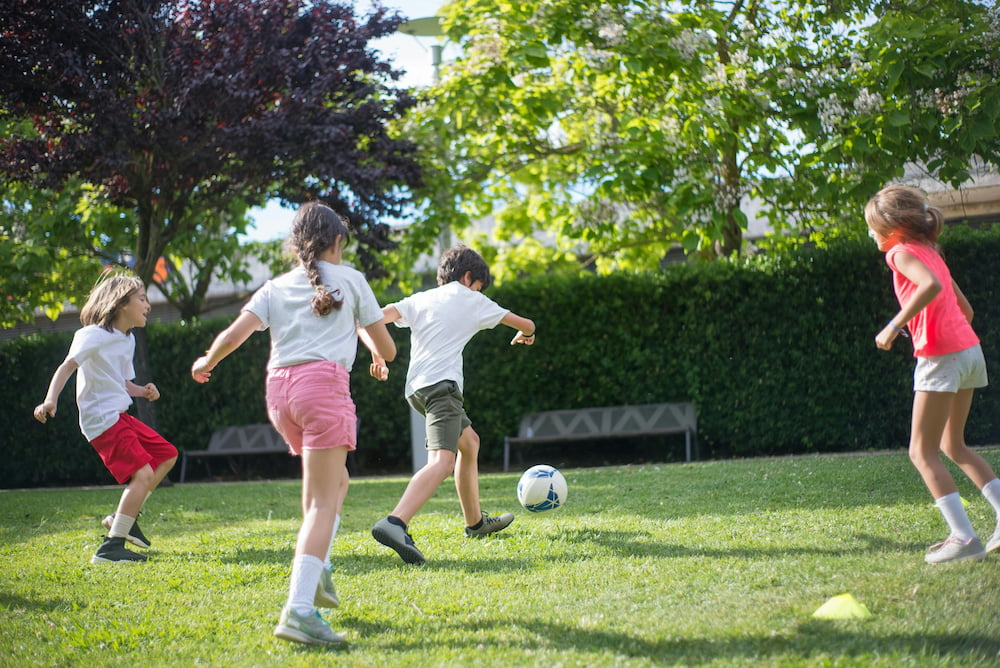
The Benefits of At-Home Football Practice for Children 🏡🏆
Share
At-home football practice offers children a fantastic opportunity to develop their skills in a fun and relaxed environment. Without the pressures of team settings, kids can grow at their own pace while enjoying the game. Practicing regularly at home builds confidence, enhances coordination, and fosters a love for football that can last a lifetime.
Football is more than just a sport; it teaches essential life skills such as teamwork, perseverance, and discipline. Developing these qualities from a young age can have a lasting impact on a child's personal and athletic growth. Whether aspiring to play professionally or simply enjoying the game for fun, consistent practice at home lays a strong foundation for success.
Don’t wait to give their training a boost! With regular, simple sessions, kids will not only improve their skills but develop a lifelong passion for football. Explore our range of training gear and get ready to see them shine on and off the field. 🌟⚽
Why Home Football Practice is Beneficial ✅
Training at home provides multiple advantages that go beyond improving football skills. It plays a crucial role in physical, mental, and social development. By creating an engaging and supportive practice environment, parents and guardians can help children stay motivated and continue improving.
Encourages Active and Healthy Lifestyles 💪
Incorporating football practice into a child's routine keeps them physically active, reducing screen time and promoting a healthy lifestyle. Running, dribbling, and kicking enhance cardiovascular endurance, muscle strength, and motor skills.
Additionally, football helps children develop better coordination and balance, which benefits overall athletic performance. Consistently engaging in physical activity at home also establishes good exercise habits that can last into adulthood.
Builds Confidence and Self-Discipline 🌟
Mastering new skills, even in a home setting, boosts a child's self-esteem. The ability to see progress—whether it's improved ball control, better dribbling, or scoring more goals—encourages perseverance and self-motivation.
Practicing regularly instills discipline, as kids learn to set goals, follow routines, and push themselves to improve. This sense of achievement carries over to other aspects of life, including academics and social interactions.
Provides a Stress-Free Learning Environment 🏡
Without the pressure of formal training sessions or matches, children can experiment with different techniques and improve their skills without fear of failure. This relaxed environment fosters creativity and enjoyment in the game.
Playing at home allows kids to learn at their own pace, free from competition or judgment. They can take their time refining techniques, developing unique playing styles, and enjoying the sport purely for the love of the game.
Strengthens Family Bonds 👨👩👧👦
Football practice at home creates a great opportunity for family members to engage in play together. Parents, siblings, or friends can join in, making the experience more interactive and enjoyable. Friendly competitions and playful drills can turn training into quality family time.
Encouraging teamwork and communication during home sessions strengthens relationships and fosters a sense of camaraderie. Parents who actively participate in their child’s training not only help them improve but also create cherished memories along the way.
Increases Focus and Cognitive Skills 🎯
Football is not just about physical activity; it also develops cognitive abilities such as decision-making, spatial awareness, and quick reflexes. Playing regularly at home helps kids learn to analyze game situations, anticipate movements, and enhance their reaction time.
Additionally, football requires strategic thinking. Kids must assess passing options, anticipate opponents' moves, and make split-second decisions. These problem-solving skills benefit them beyond sports, helping with academic performance and daily life challenges.
Making Home Football Practice Fun 🎉
A successful training routine should be enjoyable to keep children engaged. Incorporating variety, challenges, and small rewards can make practice more exciting.
- Mini Games: Turn drills into fun challenges or competitions. Create a penalty shootout contest or a dribbling race against the clock.
- Music Motivation: Play their favorite music while practicing. Upbeat tunes can help boost energy and make training sessions feel more enjoyable.
- Creative Play: Encourage kids to invent their own training routines. Let them come up with new tricks, shooting drills, or fun obstacle courses to explore their creativity.
- Set Personal Goals: Help children track their progress by setting small, achievable targets such as completing a certain number of passes or improving shooting accuracy.
Cost-Effective and Convenient Training 💰
One of the biggest advantages of practicing football at home is the accessibility and affordability. No expensive equipment or travel costs are required—just a ball and some space.
For those looking to enhance their training, Goalgetter offers affordable and effective training tools such as portable goals, agility cones, and rebounders. These simple additions can maximize the benefits of at-home practice.
Simple Equipment to Enhance Training:
- Agility cones for dribbling and movement drills.
- Mini goals for shooting practice.
- Rebounders for improving passing and first touch.
- Speed ladders to develop footwork and agility.
Investing in these budget-friendly tools ensures children get the most out of their at-home training experience without breaking the bank.
Frequently Asked Questions ❓
How much time should kids spend practicing football at home?
Short, consistent sessions of 20–30 minutes a few times a week can be more effective than long, infrequent training sessions. Keeping sessions engaging and fun helps maintain enthusiasm.
What age is best to start football training at home?
Children as young as three can start with basic ball control activities, while structured drills can be introduced from age five and up. The earlier they start, the more comfortable they will become with the ball.
How can parents encourage kids to practice at home?
Parents can join training sessions, offer positive reinforcement, and create fun challenges. Providing rewards or setting personal goals also keeps children engaged and motivated.
Conclusion ⚽
Encouraging at-home football practice is a great way to help children develop their skills, stay active, and build confidence in a fun environment. With the right exercises and a few simple tools, every session can become a motivating and exciting experience for future champions.
Whether your child dreams of becoming a professional player or simply enjoys playing football for fun, practicing at home is an excellent way to build a strong foundation. 🌟⚽
👉 Looking for more ideas? Discover exciting drills in our blog: 5 Fun and Easy football drills to Improve Kids Ball Control and Agility with Goalgetter products.
